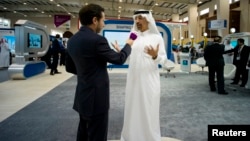Abdulaziz al-Jouf is in many ways a typical Web entrepreneur - the 34-year-old Saudi talks fast, works late and has big plans for his online payments system.
But in one aspect he's unusual: Jouf is funded by state oil company Saudi Aramco, better known for multi-billion-dollar investments in oilfields and pipelines.
Their partnership is the result of a push by Saudi Arabia to create jobs and diversify its economy beyond the oil industry - increasingly important as its population grows and oil prices fall.
The government has found it hard to promote start-ups in asociety which lacks a culture of risk-taking and where financing options for small firms are rare. As a result it is plowing oil money into small ventures in an unusual combination of state intervention and private entrepreneurship.
Saudi Aramco founded its Aramco Entrepreneurship Center (AEC) in 2011. Its managing director Sami Khursani told Reuters: "We have Aramco's support to invest more and more. Money here is not an issue - we are looking for quality deals that are entrepreneurially promising."
"We want to enhance the prosperity of the economy through product and service diversification, localizing technologies, developing small and medium enterprises and expanding the pool of Saudi entrepreneurs."
Aramco has invested over $2 million in Jouf's venture since he returned from living in the United States in 2011 and founded his firm with a staff of two. His company, PayTabs, now has 45 employees in the Middle East and North Africa, and expects to have 70 by the end of next year as it expands in Asia.
Gradually, entrepreneurship is becoming a buzz word in Saudi Arabia. Universities hold lectures on it; chambers of commerce and government agencies stage conferences on the subject; newspapers and television programs celebrate it.
Creating a culture
However, networks of angel investors and venture capital firms are still developing only very slowly.
In 2006 the Saudi government launched a major effort to fund private businesses by establishing the Kafalah program, which lends to small and medium-sized firms.
So far the fund has received 4 billion riyals ($1.1 billion) from the government and 7 billion riyals from 11 Saudi banks. But its push to create new industry has had only limited results: last year the crude petroleum and natural gas sector still accounted for 44.4 percent of gross domestic product, down only modestly from 47.5 percent in 2006.
So Saudi Aramco's AEC scheme takes a more direct approach, providing venture capital as well as loans to new businesses. It takes minority stakes in start-ups and injects up to $5 million into them, Khursani explained.
In the past three years it has funded 43 ventures in sectors including manufacturing, education and information technology.
"We will have completed around 52 deals by year-end for a value of 210 million riyals that are financially committed, and we think those companies will generate around 2,300 direct jobs by 2019," Khursani said.
But beyond the basics of capital, would-be start-ups find other obstacles waiting.
Sweeping labor market reforms to funnel more local citizens into private sector jobs have made it more difficult for firms to employ large numbers of foreign workers, raising costs for many. Sluggish state bureaucracy can make getting the necessary paperwork in other areas too frustratingly slow.
Nadia al-Dossary, a 47-year-old Saudi who plans to build a school in Khobar with a loan from the AEC, says she has been waiting for several months to obtain a construction permit from the municipality.
"I have the land, I have everything ready, but the bureaucracy at the government institutions is very stressful."
Nevertheless, Saudi Aramco's entrepreneurship drive is creating opportunities.
Dossary, 12 years a supervisor in the ministry of education, is joining a small group of female entrepreneurs in a country where women traditionally play little role in business and need permission from a male ``guardian'' to get a job.
She aims to have her school up and running by the 2016-2017 academic year, offering an international curriculum and taking in children with Attention Deficit Disorder. At present, few Saudi schools can cope with such pupils, she says.

